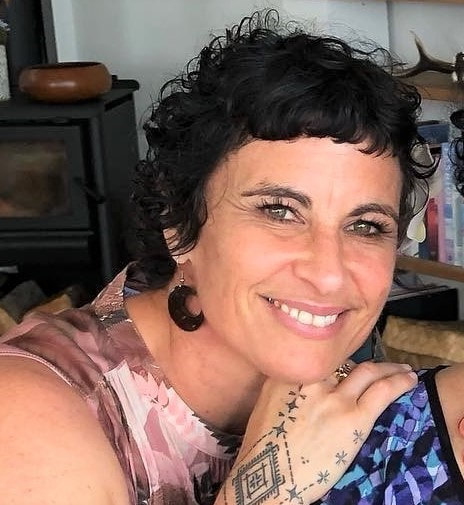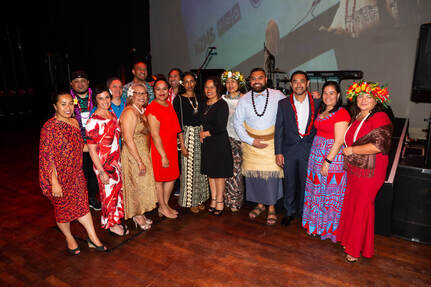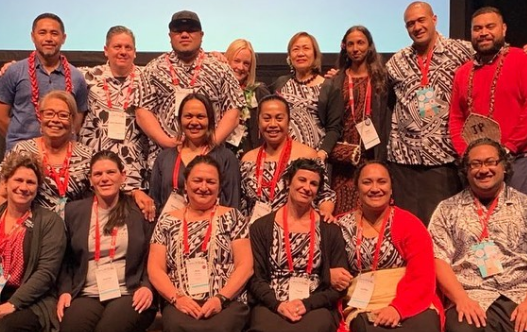We Are LIANZA: Trina Roycroft
|
Kia ora Trina and thanks so much for agreeing to be interviewed for Library Life magazine’s new column: We Are LIANZA!
In this new column we talk to members from all walks of life and stages of their careers to see who and what makes up LIANZA. You are a graduate of the International Network of Library Innovators (INELI) Oceania aren’t you? Can you tell our readers a bit about this leadership programme and what the most important things are that you learned or gained from the programme? In July 2016 I was fortunate enough to be one of the 18 people selected to be a part of the INELI (International Network of Emerging Library Innovators) Oceania programme. INELI Oceania is a leadership program funded by the Global Libraries initiative of the Bill and Melinda Gates Foundation aimed at developing innovative emerging leaders in public libraries throughout Australia, New Zealand and the South Pacific. It is part of a large network, being one of seven programs offered worldwide. The team also included four mentors, a programme manager and six sponsors.
We participated in an online learning community which, at times, proved difficult for those in remote areas within the Pacific Islands. This only added another level of determination for the group to ensure everyone was involved and had the opportunity to input ideas and learnings. Each learning module (innovation, risk management, change management, |
communication skills, advocacy and conflict management) had us working in different groups from across the nations and came with an assigned professional development team and a mentor. The mentors were invaluable in helping us with developing the skills and attitudes required to become effective innovators and leaders.
I learned so many valuable things by being a part of this amazing group of professionals. From resourcefulness, resilience, understanding and practical advice on leading teams right through to communication and humbleness. One of the most important things I have taken away from this course is how fortunate I am to be a part of a profession that values people. Having an international network of friends and colleagues to call on (and we do!) has been the absolute best thing to come out of this for me. The relationships built here over the two years are still a big part of my life.
It also led to being involved with the Pacific Libraries Network where some of the networks and mahi we began in INELI carried on in regard to the United Nations Sustainable Development Goals, pertaining to the Pacific regions.
I learned so many valuable things by being a part of this amazing group of professionals. From resourcefulness, resilience, understanding and practical advice on leading teams right through to communication and humbleness. One of the most important things I have taken away from this course is how fortunate I am to be a part of a profession that values people. Having an international network of friends and colleagues to call on (and we do!) has been the absolute best thing to come out of this for me. The relationships built here over the two years are still a big part of my life.
It also led to being involved with the Pacific Libraries Network where some of the networks and mahi we began in INELI carried on in regard to the United Nations Sustainable Development Goals, pertaining to the Pacific regions.
You were involved with the LIANZA19 Conference weren’t you? What was the process like and would you recommend others get involved with organising LIANZA conferences in the future?
|
Yes, and proudly so! I was a part of the PIMN (Pacific Island Management Network) LIANZA19 Organising Komiti. The processes we utilised were different from any other planning and organising committee I have been involved in and I am very appreciative to have experienced this. The theme “Our Families, Our Communities, Our Libraries – Nāu to rourou nāku te rourou” really held true throughout the planning and execution of the conference. We ensured the focus was on the wellbeing and success of our people.
The vision was for all participants to share, gift, reciprocate and collaborate using elements of va fealoa’i (respectful relationships), mafana (warmth), ofa (love), malie (humour) through talanoa (shared dialogue). I absolutely am delighted to say we truly stuck to the theme and the vision and the outcome was something amazing. From the keynote speakers and performers through to the workshop learnings, shared singing and party night – culture and aroha were always top of mind. |
It taught me that there are many ways to reach a goal and the way this komiti worked to deliver an amazing learning experience for the attendees was an absolute delight and I will hold dear the whole experience. I would recommend others take up the opportunity of being involved in organising any future LIANZA Conferences and to remember, you don’t have to stick to the way it’s always been done. Be brave, be courageous.
What do you think are the biggest challenges for libraries in the 21st century?
Wow, given the current COVID-19 Pandemic, the challenges we thought we may have been facing may now have morphed into something completely different! Or, perhaps it’s really begun to highlight and bring to centre the absolute necessity for us to take this opportunity to listen to our communities and learn what it is they want from us. This point in time has shown us if we have the ability to stay relevant and deliver resources, reading materials (both for learning and leisure), information (not fake news), programmes and events during a time of massive interruption and disconnection. That’s where it is folks – are we relevant in today’s world, tomorrow’s world? And if we are not, how do we recognise what it is we need to be? We actually ask, we workshop in collaboration, we actively listen, and we work really hard at being what we need to be for the people.
You are currently managing Takapuna Library and previously you managed Northcote Community Library, you are a member of LIANZA Hikuwai regional community, and PIMN and you worked on LIANZA19. You are also a member of the Pacific Libraries Network. Can you share with our readers what your personal career highlights have been?
|
At present I am managing Takapuna Library and looking after Devonport Library while the current manager is on sabbatical. Preceding this, I managed the Birkenhead Library and before that, Northcote Library.
I have been back in libraries for six years now following a six-year stint as a personal trainer. Prior to that I had been working in libraries since 1990. There have been so many career highlights, hence the reason for returning to libraries after the break. I always knew I’d be back 😊 This past six years has gone by so fast and I feel I have fitted so much in! The experiences through INELI and the Pacific Libraries Network (PLN) have been amazing. Meeting people who deliver library services with the tiniest of budgets but with a whole lot of passion and heart is very humbling. The desire to help their people move ahead, and to be able to participate and have choices in their lives is second to none. |
The many opportunities I have been given and made the most of include attending LIANZA conferences; delivering a presentation at the conference; facilitating talanoa; visiting Fiji libraries; Brisbane hosting us for the PLN; and meeting and being mentored by inspiring international leaders.
Having live tattooing in the library; building an edible garden with and for the community; delivering a Pasifika festival in our library’s backyard; helping people with their housing; and many other moments are all part of my ‘normal’ work.
The people that we get to work alongside, for and with, keep me inspired. The fact that our daily work experience is never the same day-to-day, that we work for a profession that encourages lifelong learning (for our communities and ourselves), the respectfulness and high regard of tangata whenua and other cultures, the flexibility of our delivery of services – all are a part of what keeps me interested and passionate about being a librarian. It is tough to pinpoint any particular highlight when my days are filled with so many clever, thoughtful and caring people, and special moments.
Having live tattooing in the library; building an edible garden with and for the community; delivering a Pasifika festival in our library’s backyard; helping people with their housing; and many other moments are all part of my ‘normal’ work.
The people that we get to work alongside, for and with, keep me inspired. The fact that our daily work experience is never the same day-to-day, that we work for a profession that encourages lifelong learning (for our communities and ourselves), the respectfulness and high regard of tangata whenua and other cultures, the flexibility of our delivery of services – all are a part of what keeps me interested and passionate about being a librarian. It is tough to pinpoint any particular highlight when my days are filled with so many clever, thoughtful and caring people, and special moments.
Why do you think it is important to have a national professional membership organisation such as LIANZA?
What would you like to see LIANZA do more of?
What would you like to see LIANZA do more of?
The importance of having a national professional membership organisation such as LIANZA really is in the title – professional. Having professionally recognised qualifications and skills, access to support and ongoing learning, professional development and networks is vital and communicates with our peers that we are committed to library professional standards, committed to staying up to date with the issues and trends in the profession.
It demonstrates you are an advocate for lifelong learning. It shows your intent of seriousness about the profession and how you want to contribute to its ongoing development. LIANZA also acts as a gateway to broaden professional networks beyond your immediate organisation.
Having a professional body enables better advocacy systems in place to discuss library issues and concerns with key decision makers within local councils and members of parliament for the ongoing development and strengthening of library services. Also, they are our reps when exchanging and developing library ideas with our international peers and colleagues in order to enhance learning and to ensure access to information for all.
It signifies international recognition of your skills and qualifications. Political issues regarding equal access to information (both nationally and internationally) require a professional body to keep an active presence and active dialogue in that space.
It gives us unity and strength as a group and makes us accountable for what we deliver and how we work.
The potential benefits of being a LIANZA member are many but really, as with most things in life, is measured by your level of involvement. So, get involved!
It demonstrates you are an advocate for lifelong learning. It shows your intent of seriousness about the profession and how you want to contribute to its ongoing development. LIANZA also acts as a gateway to broaden professional networks beyond your immediate organisation.
Having a professional body enables better advocacy systems in place to discuss library issues and concerns with key decision makers within local councils and members of parliament for the ongoing development and strengthening of library services. Also, they are our reps when exchanging and developing library ideas with our international peers and colleagues in order to enhance learning and to ensure access to information for all.
It signifies international recognition of your skills and qualifications. Political issues regarding equal access to information (both nationally and internationally) require a professional body to keep an active presence and active dialogue in that space.
It gives us unity and strength as a group and makes us accountable for what we deliver and how we work.
The potential benefits of being a LIANZA member are many but really, as with most things in life, is measured by your level of involvement. So, get involved!



